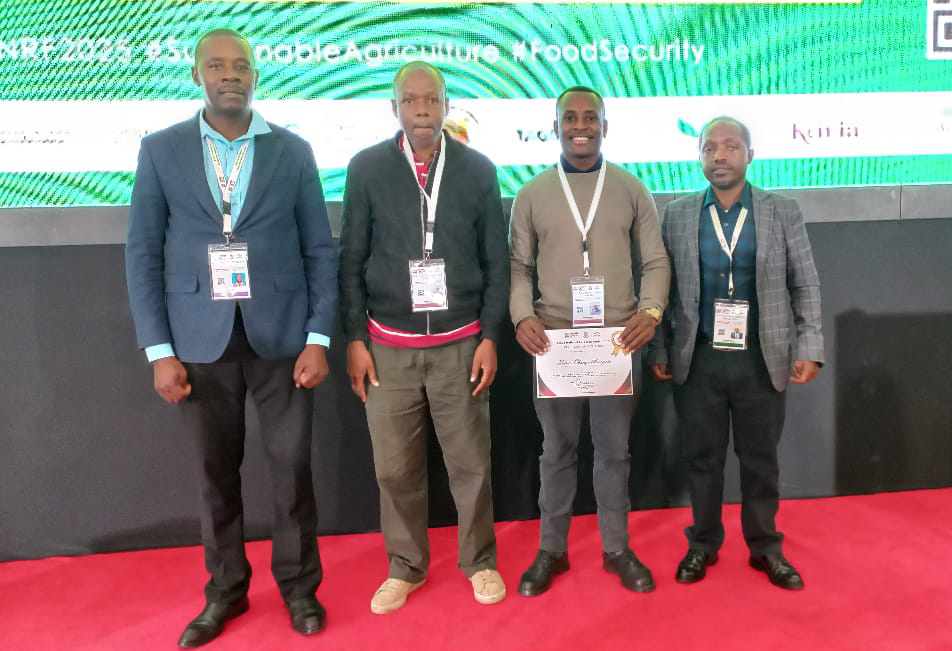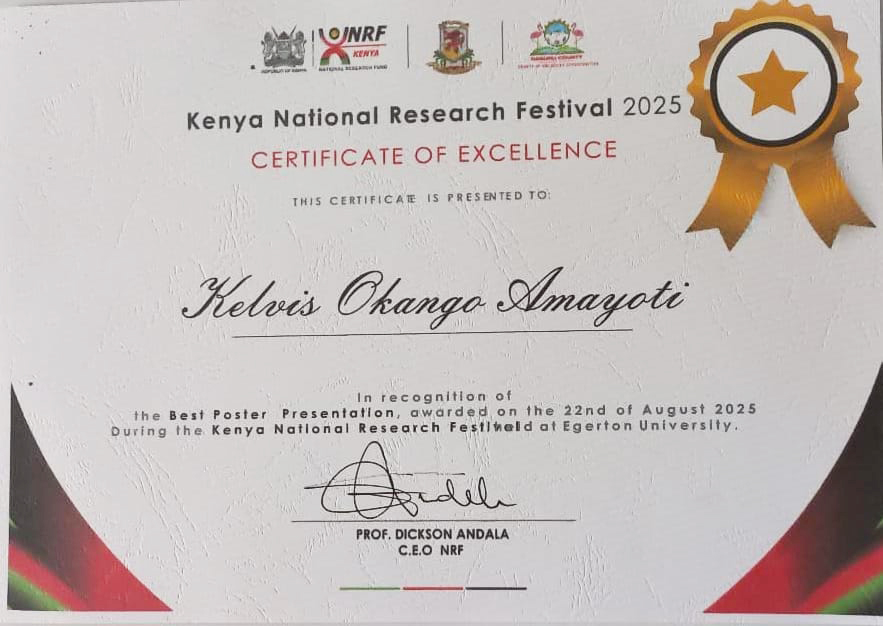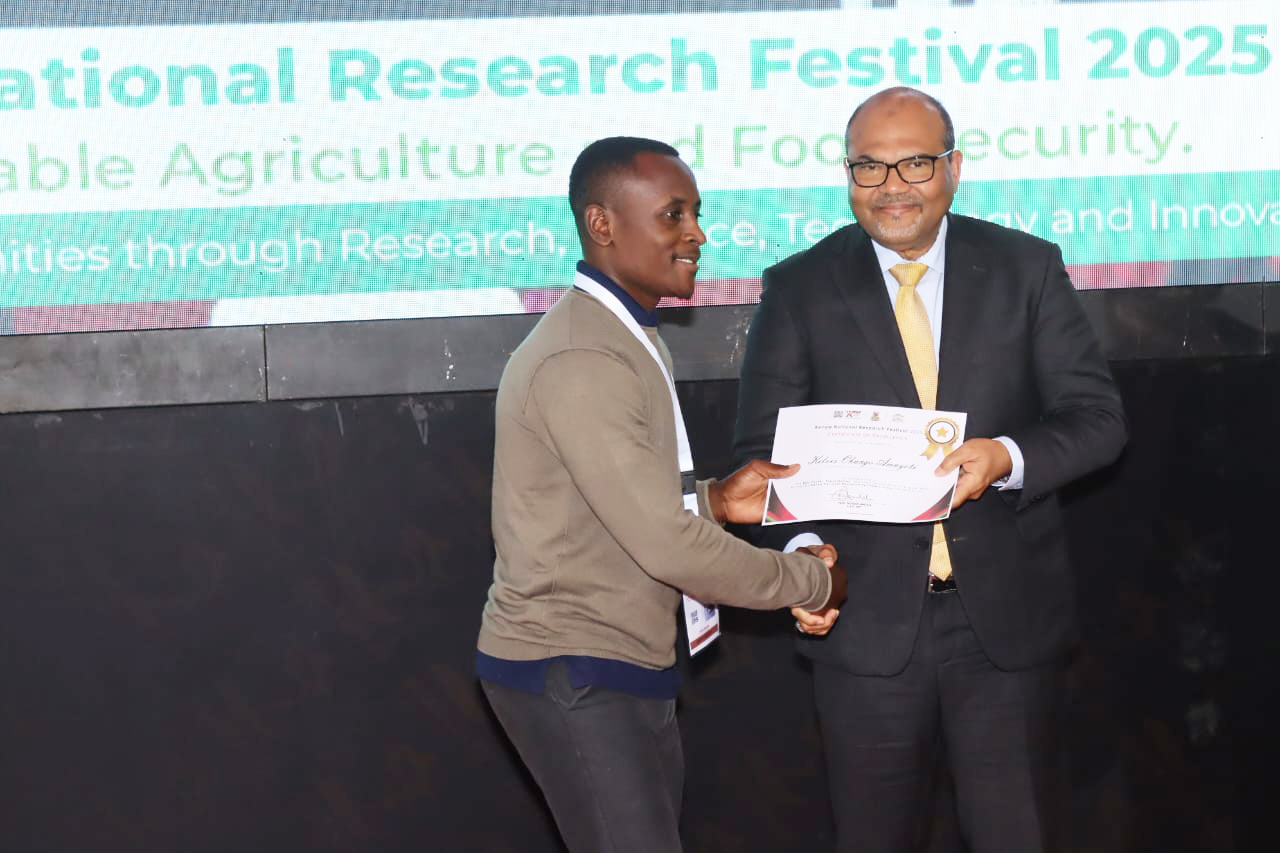Mr. Kelvis Amayoti receiving an award for the Best Poster Presentation during KNRF 2025 from the PS for Science, Research & Innovation, Prof. Abdulrazak Shaukat on Friday 22nd August 2025.
For generations, fishers in the remote Kenya’s coastal villages of Shanga-Ishakani and Siyu have grappled with the same problem: how to keep their daily seafood harvest fresh without reliable electricity.
With catches averaging 400 kilograms and 300 kilograms respectively during peak seasons, lack of cold storage has meant quick sales at low prices—or worse, massive post-harvest losses.
However, economic fortunes of these fish mongers are set to change for better, thanks to a study by Kelvis Okango Amayoti, a postgraduate student from Multimedia University of Kenya (MMU), Dr. David Wafula Wekesa and Dr. Solomon Namaswa, that offers a sustainable solution: solar-powered cold storage facilities designed specifically for off-grid fishing communities.
The research, which was awarded Best Poster Presentation at this year’s Kenya National Research Festival (KNRF) 2025 held under the theme “Sustainable Agriculture & Food Security,” assessed seafood production levels, cooling energy demands, and designed solar photovoltaic (PV) systems capable of powering cold rooms tailored to local needs.

According to Amayoti, they found that Shanga-Ishakani required a cold room capacity of 6.701 kW with daily cooling energy of 63.5 kWh, while Siyu needed 5.594 kW and 47.3 kWh.
“To meet these demands, we proposed a solar PV systems sized at 15.4 kW and 11.5 kW, supported by robust battery banks to ensure continuous operation even in cloudy conditions,” says Amayoti.
The study also reveals a strong financial viability of the project with a Net Present Value of $201,264, an Internal Rate of Return of 75%, and a payback period of just 1.41 years,
Beyond economics, Amayoti says that social impact of the project could be transformative.
“Reliable cold storage means fishers no longer need to rush their catch to markets at throwaway prices. Instead, they can store seafood safely, target premium markets, and stabilize incomes” he says, adding that the project also emphasizes gender and social inclusion, ensuring that women and youth—who play critical roles in processing and marketing fish—are integrated into the seafood value chain.
On their part, Dr. Wekesa and Dr. Namaswa observe that study captures issue of post-harvest losses, which is critical and aligned to the theme of food security.

“The use of solar energy supports climate-smart agriculture and demonstrates innovative farming envisioned to be sustainable. The gender and social inclusion in this work enhances the participation of women and youth,” they say.
Dr. Wekesa, who is MMU Director of Research and Innovation and also the National Outstanding Researcher Award (NORA) recipient for the KNRF 2024, commended the National Research Fund for organizing the KNRF, saying that since its inception, the annual festival has continued to bring together researchers, policymakers, industry leaders, and innovators while also offering platform for exchange of knowledge and collaborations on practical, scalable solutions that advance food security, climate resilience, and sustainable livelihoods for all Kenyans.
By Nicanor Ndiege

